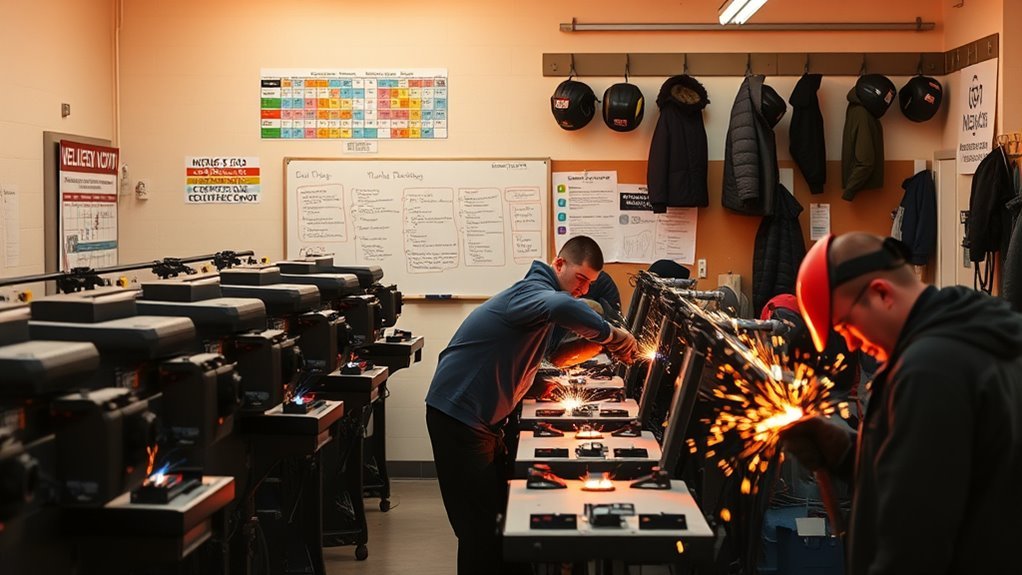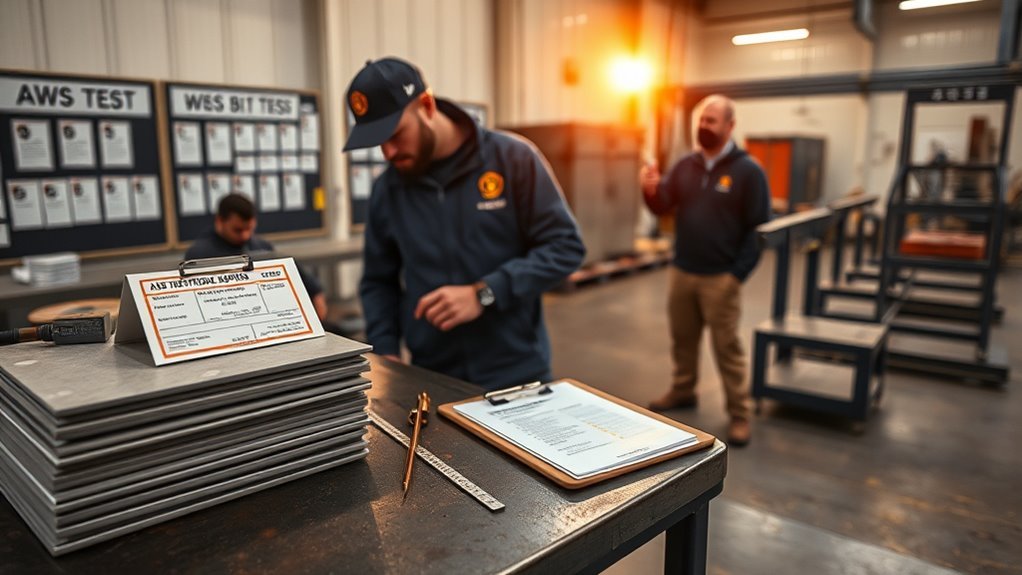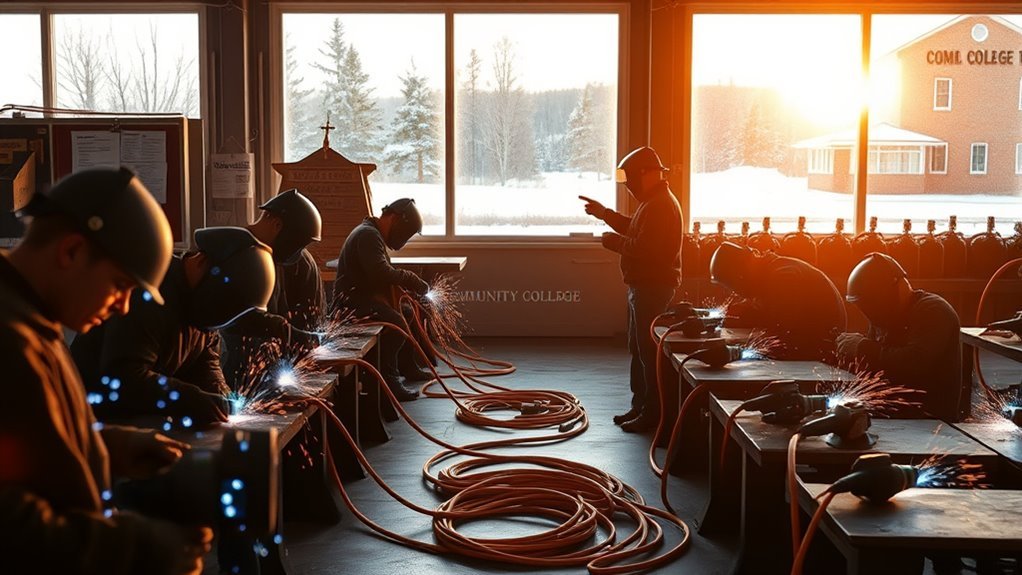You’ll typically pay about $9,900 for a full 13‑week Maine welding program, plus a $30 nonrefundable registration fee and half the tuition ($4,980) due at signup with the rest ($4,950) at midpoint. Textbooks, consumables, and basic safety gear are included; full PPE can cost $599 (or $519 if you borrow gear). Certification exams run $350–$400 extra. Financing and WIOA help are available, and more enrollment, schedule, and placement details follow.
Program Options and Lengths Available in Maine

While most Maine welding programs run an extensive 13-week curriculum (Mon–Fri, 9:00 AM–3:30 PM), you’ll also find accelerated and part-time options: a 3-day MIG Master course for rapid entry and evening classes (Mon/Wed, 6–9 PM) totaling eight sessions and 24 hours.
You’ll choose based on timeline, prior experience, and employer demand. The 13-week path delivers broad exposure to welding techniques across SMAW, GMAW, and FCAW with heavy hands-on practice and safety protocols.
Choose the path that fits your timeline, experience, and job goals — the 13-week course covers SMAW, GMAW, FCAW.
The MIG Master compresses core GMAW skills for immediate workforce entry. Evening cohorts suit upskilling or working students.
Course prerequisites are minimal for basics but may require safety orientation and basic math; advanced tracks expect prior certification or documented shop hours.
Enrollment opens Nov 1, 2025; plan accordingly.
Detailed Tuition and Fee Breakdown

The program’s total tuition is $9,900 (instruction and materials included); you’ll pay a nonrefundable $30 registration fee at enrollment and half the tuition ($4,980) up front, with the remaining $4,950 due at the program midpoint.
You’ll manage tuition payment in two clear installments; the $30 registration fee is paid once and doesn’t reduce the tuition balance.
Additional fees for certification are optional and range from $350 (limited) to $400 (unlimited).
Financing options from Community Credit Union and Five County Credit Union can cover costs if you need spread-out payments.
- Up-front: $30 registration + $4,980 tuition payment.
- Midpoint: $4,950 remaining tuition payment.
- Optional: $350–$400 certification fees.
- Financing: credit union loan options available.
What’s Included: Materials, PPE, and Textbooks

You’ll get textbooks, safety equipment, and consumable materials covered in the $9,900 tuition, with a $30 nonrefundable registration fee due at enrollment.
You’re responsible for your personal PPE unless you opt to borrow gear at a reduced fee, and optional AWS certification tests run $350 (limited) or $400 (unlimited).
Review included manuals, welding consumables, and required PPE so you can budget any additional out-of-pocket costs.
PPE and Safety Gear
Many students pay $9,900 for the full welding program in Maine, which covers instruction, materials, and required safety equipment so you won’t face unexpected basic supply costs.
You’ll still pay a $30 nonrefundable registration fee at enrollment. The program emphasizes personal protective gear importance: textbooks are included and a full PPE package is offered for $599 (or $519 if you borrow a helmet and jacket).
Financial assistance, including WIOA, can offset PPE and safety gear costs for eligible candidates. You should evaluate fit, certification stickers, and replaceable parts before buying.
- Full PPE package: $599 (or $519 with borrowed helmet/jacket)
- Registration fee: $30
- Textbooks: included
- Financial aid: WIOA eligibility possible
Consumables and Materials
Because tuition covers core supplies, you won’t need to buy most consumables for training—the $9,900 fee includes instruction and the materials required for lab work, plus safety equipment and textbooks—though you’ll still pay a $30 nonrefundable registration fee at enrollment.
You’ll receive PPE and the consumables needed for hands-on welding practice, so out-of-pocket consumable costs are minimal during the program. Material requirements for projects—electrodes, filler wire, gas—are supplied under the tuition bundle.
If you qualify for WIOA or similar aid, that funding can offset any incidental material costs. Note that optional AWS certification fees (roughly $350–$400) aren’t included and are separate from program material requirements and covered consumables.
Textbooks and Manuals
One clear advantage of the $9,900 tuition is that it covers all required textbooks and technical manuals, so you won’t need to budget separately for course literature. That inclusion cuts typical textbook costs and delivers standardized manual resources you’ll rely on in lab and OSHA-aligned safety sessions.
You still pay a $30 nonrefundable registration fee and must source PPE; opting to buy a helmet and jacket reduces your registration exposure to $519.00. If you enroll early in 2025 you can apply a $650 discount to reduce net cost.
- Textbook costs: zero out-of-pocket for required titles.
- Manual resources: up-to-date, course-specified technical manuals provided.
- PPE: separate purchase options affect registration fees.
- Early-bird: $650 savings on total tuition.
Certification and Testing Costs (AWS and Others)

If you plan to earn AWS credentials, expect certification fees separate from the $9,900 program tuition: limited D1.1 structural tests run $350 and unlimited tests $400. You’ll see certification benefits in job placement and credibility; testing procedures follow AWS standards and the program offers prep classes. Accreditation by AWS since 2009 means recognized credentials.
| Test Type | Cost |
|---|---|
| D1.1 Limited | $350 |
| D1.1 Unlimited | $400 |
| Other AWS Options | Varies |
You’re encouraged to test after demonstrating sound welding skills in coursework. Fees are paid separately from tuition. The school provides exam scheduling, equipment, and instructor oversight to align testing procedures with industry expectations.
Financing, Scholarships, and Funding Sources

You’ll need to compare financing options—Community Credit Union and Five County Credit Union offer plans that can spread the $9,900 tuition (plus a $30 registration fee) over time.
Check eligibility for WIOA funding and note that an early-bird discount of $650 (for 2025 enrollments) can materially reduce your out-of-pocket cost.
Also budget for optional certification fees ($350–$400) and research scholarships or grants that may further lower your net expense.
Financing Options Overview
Because welding training brings clear career ROI, it’s worth mapping the funding routes that can slash your out-of-pocket cost: you should explore payment plans and financial aid first — total tuition is $9,900 (includes materials) plus a $30 nonrefundable registration fee.
Community Credit Union and Five County Credit Union offer financing to spread that cost. WIOA funding can cover eligible candidates’ training. An early-bird discount of $650 for 2025 enrollment reduces net tuition.
Optional certification exams cost $350 (limited) or $400 (unlimited) and can be rolled into financing.
- Tuition financing through local credit unions: flexible terms, applies to full $9,900.
- WIOA: conditional funding for qualified applicants.
- Early-bird discount: subtract $650 from tuition.
- Certification fees: financeable add-ons.
Scholarships and Grants
While WIOA, credit-union financing, and the early-bird discount cut direct costs, scholarships and grants can further reduce—or sometimes eliminate—out-of-pocket tuition for Maine welding students. You should target scholarship opportunities from trade groups, local unions, community colleges, and employers. Grant applications through state workforce programs and foundations often prioritize credentialed programs like welding. Track deadlines, eligibility, and required documents; awards vary and can cover tuition, tools, or certification fees (AWS testing: $350–$400). If you qualify for WIOA, combine it with scholarships to lower the $9,900 program cost (early-bird: −$650). Use credit-union payment plans for remaining balances.
| Source | Typical focus |
|---|---|
| Trade groups | Skills-based awards |
| Local unions | Apprenticeship prep |
| Colleges | Need/merit aid |
| Employers | Workforce pipelines |
| State grants | Credential funding |
Schedule Options: Day, Night, and Short Courses
Looking for a schedule that fits your life? You’ll find clear options: intensive daytime trades training, limited-evening classes for working students, and short specialty courses.
Day class benefits include 13 weeks of hands-on practice, Monday–Friday, 9:00 AM–3:30 PM, ideal for skill depth and faster completion.
Day classes deliver 13 weeks of intensive, hands-on training—Monday–Friday, 9:00 AM–3:30 PM—for faster skill mastery.
Night class flexibility gives working adults access with Monday and Wednesday evenings, eight sessions totaling 24 instruction hours; note you must provide your own PPE (safety packages sold separately).
A 3-day MIG Master short course accelerates entry into the trade.
- 13-week day program: full-time hands-on training.
- Night classes: twice-weekly, 24 hours total.
- 3-day MIG Master: focused, fast-track.
- 2026 enrollment opens Nov 1, 2025.
Job Placement Outcomes and Return on Investment
If you complete the welding program, you’ll join a cohort with a 75% placement rate and many students who land jobs before graduation, reflecting strong employer demand for the hands-on, certification-ready skills taught here.
You’ll benefit from alignment with current welding employment trends: employers seek certified technicians with pipeline, structural, and fabrication competencies.
The program’s certification focus improves your marketability and can raise starting pay above baseline rates.
In Maine the average wage for welders, cutters, solderers, and brazers is $24.00 per hour, so your tuition can translate into a clear return on investment when you secure steady work.
Track placements, certification pass rates, and local employer hires to evaluate ROI against industry salary expectations.
How to Enroll and Important Deadlines
Because enrollment hinges on eligibility screening, you’ll start with an in-person or phone interview to confirm readiness for the welding program.
Follow the enrollment process and meet the application timeline to secure spots and discounts. Enrollment opens November 1, 2025; early bird registrants receive a $650 discount for 2025 courses.
- Complete interview and submit $30 nonrefundable registration fee.
- Pay 50% of tuition ($4,980) at enrollment to hold your seat.
- Pay remaining $4,950 at course midpoint per payment schedule.
- Optional certification tests: $350 (limited) or $400 (unlimited) — choose based on skill readiness.
Track deadlines precisely; missed payments forfeit early bird pricing and can cancel enrollment.
Frequently Asked Questions
Are Part-Time Apprenticeships Available Alongside School Programs?
Yes — you can pursue part-time apprenticeships alongside school programs. You’ll gain apprenticeship benefits like paid training and real projects, because many schools maintain school partnerships with local shops, enabling coordinated schedules and credential alignment.
Do Online Welding Theory Classes Count Toward Certification?
Yes — but with caveats. Online coursework validity can satisfy some certification requirements, yet you’ll need hands-on hours and specific testing at accredited centers; check the cert body’s rules and document practical competencies before relying solely on theory.
Can Out-Of-State Students Get In-State Tuition Exceptions?
Yes—you can qualify for in-state tuition exceptions if you meet specific residency requirements; institutions often grant tuition waivers for documented employment, military service, or hardship. Check college policies, required proofs, deadlines, and approval rates.
Is Equipment Storage Available Between Classes?
Yes — you can usually store gear between classes; imagine boots and helmets lined up neatly. Schools offer equipment rental, locker space, and enforce strict safety regulations, so your tools stay secure, inspected, and compliant.
Are Refresher Courses Offered for Lapsed Welders?
Yes — programs offer refresher course benefits like hands-on practice, certification prep, and safety updates; you’ll access lapsed welder resources, structured modules, and competency assessments to quickly regain certifications and meet employer standards.
Conclusion
You’ll pay anywhere from about $2,000 for a short certificate to $25,000+ for extensive programs, but median Maine welding grads see a 12% wage increase within a year—an important ROI metric. Pick programs that include materials/PPE and AWS testing or budget an extra $500–$1,200 for certification. Explore state grants, employer apprenticeships, and flexible schedules to lower upfront cost. Apply early; rolling admissions and limited night seats fill fast.


